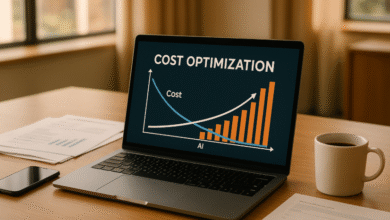AI-Powered Mobile Apps: Crafting Personalized User Journeys in 2025

Imagine opening up your mobile, prior to pressing an icon, the most anticipated content is waiting for you. Whether it’s a streaming app suggesting a movie that perfectly matches your mood or a productivity tool proactively reminding you of tasks, the era of hyper-personalization in mobile apps is here. What is the driving factor? AI.
The year 2025 is when AI-powered mobile applications are predicted to revolutionize how people engage with tech. Thanks to advances in machine learning and natural processing of language (NLP) as well as advanced analytics that predict, these applications are set to design experiences for users that feel personally connected, meaningful, and effortless.
This blog will examine the way that new AI technology is shaping customized user experiences. It will highlight significant usage cases, discuss the emerging trends such as the voice interface and Augmented Reality, and discuss the issues developers face when making these apps.
For tech-savvy developers or even marketers who are looking to get an edge, learning how to use AI efficiently could be the key to making every impact. Also, if you are considering partnering with a mobile app development company UK, then this guide is surely your essential read.
Powerful AI Technologies Enabling Personalization
In order to understand the power of personalized mobile apps that are personalized, we must understand the AI techniques that are driving these advances.
Machine Learning (ML)
Machine learning is the core of AI-powered personalization that is being used by literally every mobile app development company throughout the world. ML helps study the behavior of users in the past and predict future needs with astonishing accuracy. Like, for instance, Spotify curating a custom playlist titled “Discover Weekly” is a consequence of advanced machine algorithmic learning.
See also: How HONOR X8c’s MagicOS 9.0 Enhances User Experience
Natural Language Processing (NLP)
Because of NLP, Mobile applications can today understand and interact with users using human-like methods. Consider virtual assistants similar to Siri as well as Alexa. They use NLP to recognize spoken commands, offer smart responses, and can even recognize subtle emotional clues within a person’s voice.
Predictive Analytics
Have you noticed that Google Maps shows traffic conditions as well as estimated delays prior to you getting to the highway? This is predictive analytics in action. In the process of processing data from historical records such as user habits, patterns of use, and inputs from real-time, apps offer highly pertinent recommendations that are tailored to the individual.
Personalized User Journeys: Use Cases and Examples
The infusion of AI allows for personal user experiences not just achievable but even desired. Find out how diverse sectors are using AI to enhance the experience of users by using mobile applications.
1. E-commerce Apps
AI brings life to e-commerce applications by curating recommendations for products that are based on user preferences as well as purchase history, as well as browsing patterns. As an example, apps like Amazon as well as ASOS have created “Inspired by your shopping habits” sections, which lead to more engagement and better sales conversion rates.
2. Fitness and Health Apps
Apps such as Fitbit and Headspace utilize AI to create highly personalized exercise routines and mindfulness tracks and adapt recommendations according to user-activity data as well as health-related inputs, including steps as well as heart rate, and the logging of state of mind.
3. Content Streaming Platforms
Netflix and YouTube take user experiences to a new level thanks to AI-powered suggestions and autoplay queues that be able to read your mind. In conjunction with local preferences as well as viewing history, AI ensures viewers are always just a click away from the button.
4. Finance Apps
Applications like Mint and PayPal use AI to provide useful financial information. They can, for instance, help users budget or identify spending patterns that seem unusual or recommend customized investments based on analytics.
5. Travel Apps
Personalized recommendations for places, accommodations, itineraries, and other details are what make services like Airbnb, as well as Hoppe, vital. AI’s ability to predict travel patterns also helps travelers find the top prices for travel by using the use of analytics to determine pricing models.
Future Trends in AI-Powered Mobile Apps
What’s the future in store for apps that are personalized apps? Here are some of the most intriguing technologies poised to redefine the mobile experience by 2025.
Voice Interfaces and Conversational AI
Conversational interactions with voice will soon become an important feature due to advances in NLP. Instead of having to manually navigate the app, users can depend on chat-based interfaces to accomplish tasks quickly. Image telling the app “Book me a flight to New York under $400,” and let the app do everything.
Augmented Reality (AR) Integration
AR coupled together with AI AR, coupled with AI, can offer revolutionary possibilities for personalization. Applications such as IKEA Place already offer AR tools that allow you to visualize furniture you have in your living space. The technology will be able to provide relevant product recommendations when you hold your smartphone camera while shopping.
Ethical AI and Transparent Experiences
The ethical AI practices will rule the discussion as people want privacy and full disclosure. Mobile apps powered by AI will have to justify the personalization effort in order to protect the sensitive information of their users.
Challenges in Developing AI-Powered Mobile Apps (And Solutions)
The potential for personalized AI is fascinating; however, there are some practical challenges associated with the implementation of such sophisticated technologies.
1. Data Privacy Concerns
The public is becoming more cautious when it comes to sharing information. In order to combat this, companies must implement encryption protocols that are industry standard and adhere to laws like GDPR and CCPA. Informing users about the way their personal data is utilized adds another security layer.
2. Technical Complexity
Making and integration AI features demands technical know-how. A partnership with a reliable mobile app development company UK or a team that has specialized knowledge in machine learning can speed creation and minimize the chance of errors.
3. High Development Costs
AI application development typically has a high cost due to the specific algorithmic models and cloud-based technology. But using open-source software and already-trained AI models could save time and money.
4. Adoption Among Users
Certain users may find artificial intelligence-powered personalized settings invasive or unnecessary. An easy onboarding process that includes the option to consent by users as well as adjustable settings for personalization can assist users in feeling more at ease.
The Future Is Personalized
The advent of AI within mobile applications is causing a paradigm transformation in how people experience technology. In turn, by turning massive amounts of information from users into useful insights, the AI-powered apps can create journeys that are effortless, useful, and incredibly engaging. It doesn’t matter if it’s predictive analytics that can identify the needs of a person before they have to inquire or NLP creating more natural interactions, AI is carving the way for the future.
for businesses and developers for businesses and developers, the right time is right now. If you’re looking to build apps powered by AI, joining forces with a seasoned mobile app development firm or mobile application development firm located in UK UK could accelerate your plans.
The future of mobile-based experiences is just as much about technological advancements as the careful implementation of AI to help users. Are you ready to design experiences that will resonate by 2025 and the years after?




